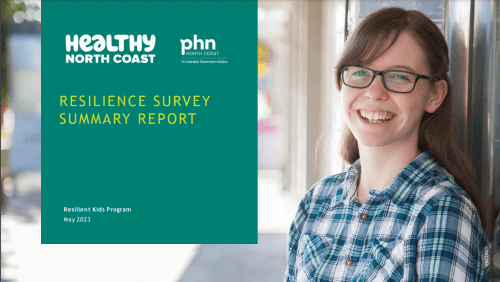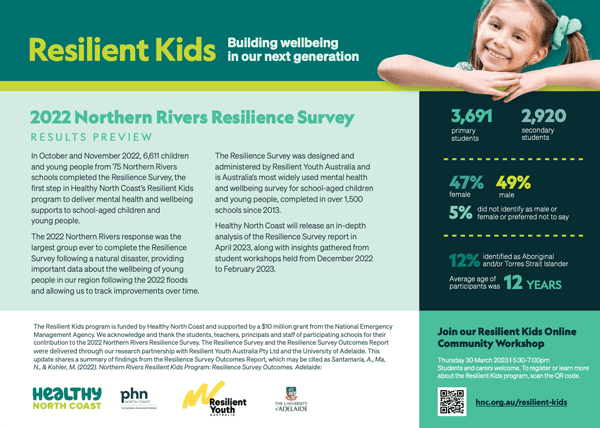Resilience Survey — information for schools
As part of the Resilient Kids program, Healthy North Coast partnered with schools across the Northern Rivers to deliver Resilient Youth Australia’s Resilience in October and November 2022.
Each school has its own secure client portal to access real-time aggregated survey data and a regional report will also be developed.
As well as informing the Resilient Kids program across the Northern Rivers, the survey will also deliver an evidence-based data set for your school population, giving a rich picture of student wellbeing, specific to different age groups and cohorts. This will help your school to design targeted wellbeing initiatives, tailor classroom approaches and plan for professional development
The online survey is accessed via a website link and a unique code is supplied to each school. It is completed online in class time and under teacher supervision. Students will be able to complete the survey in under 30 minutes.
Resilient Youth Australia has provided resources for schools undertaking the survey.
Resilient Youth Australia has provided resources for schools undertaking the survey, including a checklist for principals, advice for teachers supervising the survey and an instructional video.
For technical assistance or support for the survey, please contact:
Scott Jennens
Partnerships Manager – Resilient Youth Australia
[email protected]
0476 282 711
Your school’s survey data will be available through a secure online portal in a full range of formats, with easy to read and interpret gender and year level detail. Information and data gathered from Catholic schools will be available from the school’s pastoral lead. A Regional Report will also be distributed to participating schools as part of the Resilient Kids program.
Registrations for the survey are now closed.
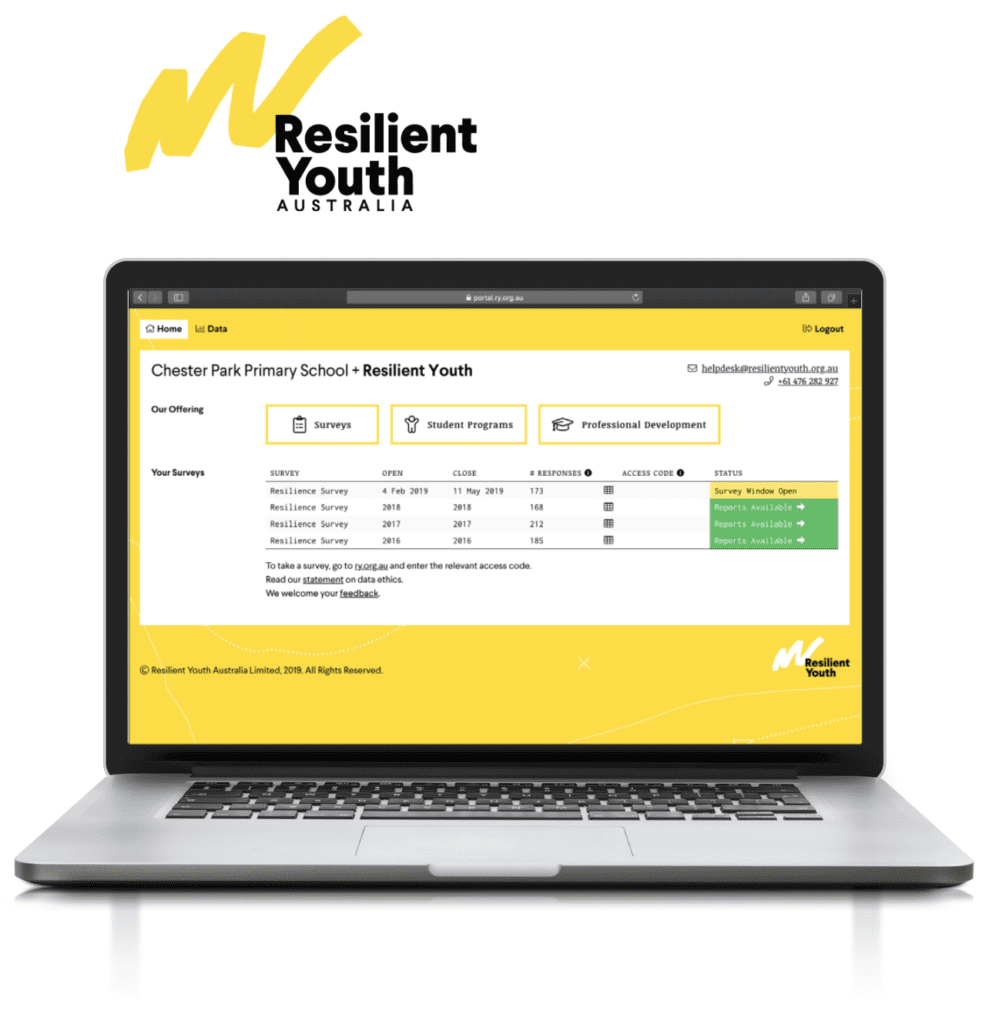
Resilience survey
Resilience Survey — information for parents and caregivers
As part of the Resilient Kids program, Healthy North Coast partnered with schools to deliver Resilient Youth Australia’s Resilience Survey to schools across the Northern Rivers in October and November 2022.
Each school has its own secure client portal to access real-time aggregated survey data and a regional report will also be developed.
The Resilience Survey is Australia’s most widely utilised mental health and wellbeing survey for schools, already completed by more than 500,000 students in over 1,500 schools since 2013. It is conducted by Resilient Youth Australia, a leader in mental health and wellbeing data for Australia’s youth, and was co-designed with the University of South Australia.
Students will complete the survey online or as a paper copy at school during school time. It is user-friendly for students aged 7 years and over, and takes about 30 minutes to complete.
- “Do you feel safe at school?”
- “I have a teacher who cares about me”
- “Do you have fun at school?”
The survey has been reviewed and approved by the Human Research Ethics Committee at the University of Adelaide (approval number 22/82). This research project will be conducted according to the NHMRC National Statement on Ethical Conduct in Human Research 2007 (Updated 2018).
If you wish to speak with an independent person regarding any concerns, please contact the Human Research Ethics Subcommittee on [email protected] or (08) 8313 4936. Any concern will be treated in confidence and you will be informed of the outcome.
Resilience survey
Healthy North Coast funds and supports a range of services to support mental health and wellbeing for children and young people.
headspace
headspace centres offer mental health support and advice for young people aged 12 to 25. All services are free or low cost. Headspace centres are located at the Lismore Health Precinct at South Cross University, Tweed and Grafton, and are open Monday to Friday, 9am to 5pm.
Alternatively, headspace can also support young people online or by phone.
Safe Haven Community and wellbeing hubs
Located in Woodburn, Lismore, Mullumbimby and Murwillumbah, Safe Haven hubs are open to anyone seeking mental health support, including their family, friends and carers. Safe Haven hubs are open 12 — 6pm every day. Drop-ins are encouraged and you don’t need a referral or appointment. Visit the Safe Haven website to learn more.
If you need immediate support:
- 24hr Mental Health Line — 1800 011 511
- Lifeline — 13 11 14
- Beyond Blue — 1300 224 636
- For children under 12 years: 24/7 Kids Helpline — 1800 551 800
- In an emergency, call 000 or go to your nearest hospital emergency department
In October and November 2022, 6,611 children and young people from 75 Northern Rivers schools completed the Resilience Survey, the largest group ever to complete the Resilience Survey following a natural disaster.
- 3,691 primary students
- 2,920 secondary students
- 47% female
- 49% male
- 5% did not identify as male or female or preferred not to say
- 12% identified as Aboriginal and/or Torres Strait Islander
- Average age of participants 12 years
Preliminary results for the survey are presented here. In April 2023, Healthy North Coast will release an in-depth analysis of the Resilience Survey report, along with insights gathered from student workshops held from December 2022 to February 2023.
As part of the Resilient Kids program, Healthy North Coast partnered with schools across the Northern Rivers to deliver Resilient Youth Australia’s Resilience in October and November 2022.
What is the Resilience Survey?
The Resilience Survey is Australia’s most widely utilised mental health and wellbeing survey for schools, already completed by more than 500,000 students in over 1,500 schools since 2013. It is conducted by Resilient Youth Australia, a leader in mental health and wellbeing data for Australia’s youth, and was co-designed with the University of South Australia.
Why do we need a survey?
We need to understand how our young people are doing and design supports to meet their needs. The survey will establish a baseline, so we can see what impact the Resilient Kids program has over time. The survey will also deliver an evidence-based data set for each school population, giving a rich picture of student wellbeing, specific to different age groups and cohorts.
What kind of questions does the survey ask?
The Resilience Survey asks young people about their thoughts and feelings related to school, family, friendships, community, and themselves. It incorporates gold-standard international measures of anxiety, depression, hopefulness, life satisfaction and coping. Sample questions include:
- “Do you feel safe at school?”
- “I have a teacher who cares about me”
- “Do you have fun at school?”
Does the survey have ethics approval?
The survey has been reviewed and approved by the Human Research Ethics Committee at the University of Adelaide (approval number 22/82). This research project will be conducted according to the NHMRC National Statement on Ethical Conduct in Human Research 2007 (Updated 2018).
How do I register our school’s participation?
Registrations for the survey are now closed.
Key results
Preliminary survey results indicate that children and young people in the Northern Rivers are generally displaying similar levels of wellbeing as compared to the national average of all 2021 Resilience Survey participants, a cohort of more than nearly 64,000 young Australians aged 7 to 18 across grades 3 to 12. In some areas, though, our young people are at greater risk of adverse mental health outcomes.
- Most primary students report moderate to high overall life satisfaction and most secondary students report moderate overall life satisfaction, similar to the 2021 Resilience Survey national average for both groups.
- However, almost 1 in 3 primary students and more than 1 in 3 secondary students are at risk for depression and anxiety.
- Students not identifying as male or female were at greatest risk for both depression and anxiety.
- More than 40% of all primary students were at risk of trauma-related stress. Ratings of trauma-related stress were lower for secondary kids, with less than 20% at risk of trauma-related stress.
- In line with the 2021 Resilience Survey national average, most primary school students engage in physical protective factors regularly including healthy eating, obtaining adequate sleep, and keeping physically fit.
- Students feel protected, with approximately 70% reporting always feeling safe in their schools and homes.
- Approximately 4 in 10 primary students and 3 in 10 secondary students report being bullied at school, and 2 in 10 online.
- 10% of secondary students engage often or frequently in risky behaviours including vaping, smoking, drinking alcohol or using illegal drugs.
- Primary and secondary school students generally feel connected within their social support structures including teachers, family and peer support. Students generally report being trusting and forgiving towards themselves and others.
- Most students report they try hard, enjoy learning, engage in extra-curricular activities and have fun at school. Despite this, almost 30% of primary students and 40% of secondary students appear disengaged from learning.
Resilient Kids
Building wellbeing in our next generation
Good mental health is important for every child’s development, to help them deal with challenges, feel good about themselves, build healthy relationships and enjoy life.
Healthy North Coast is partnering with schools, communities and mental health professionals to deliver mental health and wellbeing supports for children and young people across the Northern Rivers as part of our community’s recovery response to the 2022 flood events.
Resilient Kids Program
The Resilient Kids Program will implement mental health and trauma-informed supports for primary and secondary school-aged children impacted by the March 2022 Northern Rivers flood events. It is funded through a $10 million grant from the National Emergency Management Agency and is being delivered by Healthy North Coast.
Resilient Kids will deliver initiatives that support children and young people to recover from trauma, reduce long-term mental health impacts of natural disaster, and promote social and emotional wellbeing. The program will focus on children and young people aged 8 -18 and will include targeted supports for First Nations children and kids living with intellectual disability or autism.
Resilient Kids will follow a robust commissioning process with four stages: consultation and data collection, solutions design, service delivery and evaluation.
Consultation
In October and November 2022, children and young people across the Northern Rivers participated in the Resilience Survey.
A total of 6,611 children and young people from 75 schools completed the survey, the largest group ever to complete the survey following a natural disaster.
The results provide important data about the wellbeing of young people in our region, so we can establish a baseline and track improvements over time. More information about the survey and results is outlined below.
Through six face-to-face workshops between December 2022 and March 2023, young people across the region shared their experiences of the flooding event, what impact it had on their lives and the types of mental health and wellbeing supports they want in their schools and communities.
Solutions co-design
In March and April 2023, using information from the Resilience Survey, best-practice evidence, and the insights from student and community workshops, mental health and education professionals collaborated in three service design workshops with young people, family and community members to co-design tailored mental health supports solutions for young people in our region. Specific needs of children and young people with a disability and First Nations young people were also prioritised in this exercise.
At the completion of the Resilient Kids Co-design project, a recommendations report was developed to inform the service design and eventual commissioning of services in the Northern Rivers region.
The aims of the service design workshops were to use the outcomes from the Resilience Survey, Student workshops and co-design workshops and develop clear description of the services, including the scope of services, for Healthy North Coast to procure services for the HNC Resilient Kids Program. It was determined that the Resilient Kids Program would be delivered in three Streams:
- Education and Skill Building (school-based services)
- Community Resilience Building (delivered through a hub and spoke model of care)
- First Nations Initiatives
Please see the image below for more information about the Resilient Kids Service model.
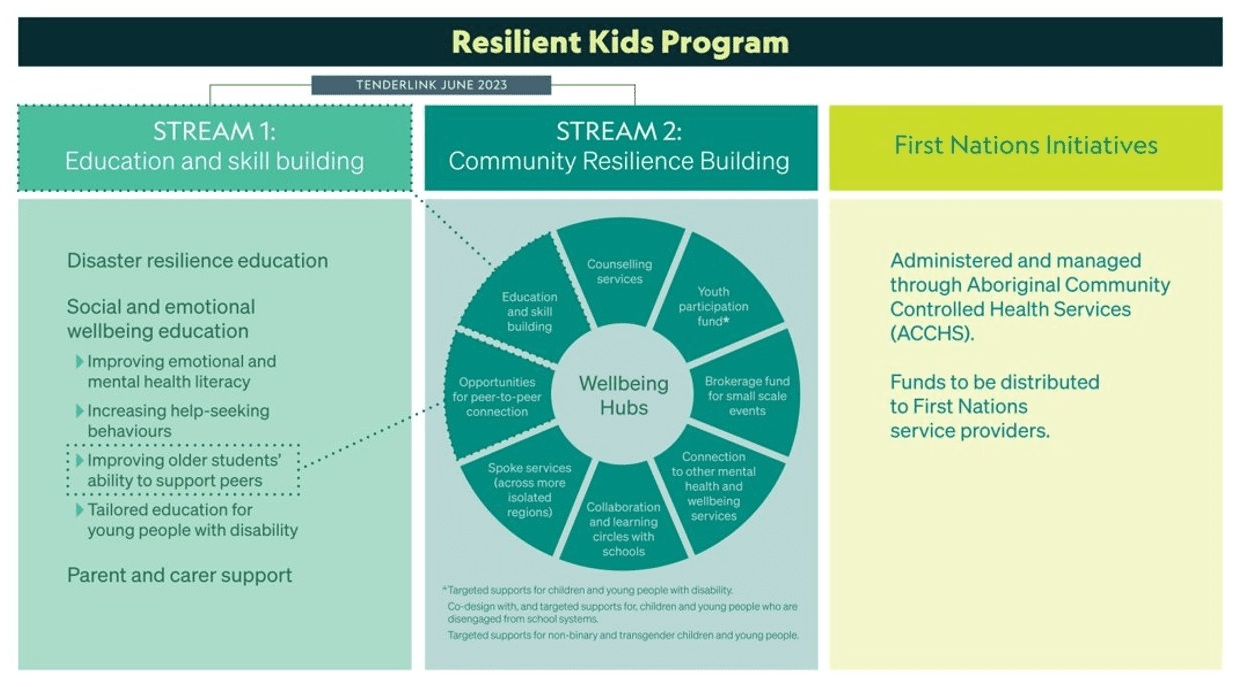
Service delivery
In June 2023, Healthy North Coast invited service providers to tender to deliver Stream 1 and 2 of the Resilient Kids Program. Following a robust tender process, in September 2023, Healthy North Coast was pleased to be able to announce that Social Futures, in consortia with The Family Centre and Human Nature Therapy will be delivering Stream 1 and 2 of the Resilient Kids Program.

More information about the services can be found on the Resilient Kids Program commissioned service page.
In September and October 2023, Healthy North Coast will be delivering co-design workshops with the Northern Rivers Aboriginal Medical services to develop a service framework targeted for First Nations children and young people, and their families, carers and kinship groups.
In a commitment to continuous improvement, alongside the service delivery will be the Evaluation of the Resilient Kids Program.
In July-June 2023, Healthy North Coast sought proposals for the Evaluation of the Resilient Kids Program. In June 2023, Healthy North Coast was pleased to award Beacon Strategies as the successful provider. Beacon Strategies will work alongside Social Futures, The Family Centre, Human Nature Therapy, Stream 3 providers and Healthy North Coast to deliver the evaluation of the Resilient Kids Program. The evaluation approach will be as follows:
- Developmental approach: ensuring new information is incorporated into the Resilient Kids Program as well as the overall evaluation.
- Formative Evaluation: focus on the effectiveness of initiatives and approaches, analyse emerging results, identify barriers to evaluation and incorporate learnings.
- Impact Evaluation: assess program outcomes and work with providers to build the evaluation capacity of the sector.
The delivery of the program will be overseen by the Resilient Kids Reference group. The group has representatives from the following sectors: Health & mental health, education, community services, disability support services, Aboriginal Community Controlled organisations and state and federal government agencies/
The purpose of the Resilient Kids Reference group is to support the delivery of the Resilient Kids program by providing expert local insights and knowledge in supporting the capacity and resilience of children, young people, their parents and carers and schools in the Northern Rivers affected by the 2022 catastrophic flooding.
Resilience Survey — information for schools
As part of the Resilient Kids program, Healthy North Coast partnered with schools across the Northern Rivers to deliver Resilient Youth Australia’s Resilience in October and November 2022.
Each school has its own secure client portal to access real-time aggregated survey data and a regional report will also be developed.
As well as informing the Resilient Kids program across the Northern Rivers, the survey will also deliver an evidence-based data set for your school population, giving a rich picture of student wellbeing, specific to different age groups and cohorts. This will help your school to design targeted wellbeing initiatives, tailor classroom approaches and plan for professional development
The online survey is accessed via a website link and a unique code is supplied to each school. It is completed online in class time and under teacher supervision. Students will be able to complete the survey in under 30 minutes.
Resilient Youth Australia has provided resources for schools undertaking the survey.
Resilient Youth Australia has provided resources for schools undertaking the survey, including a checklist for principals, advice for teachers supervising the survey and an instructional video.
For technical assistance or support for the survey, please contact:
Scott Jennens
Partnerships Manager – Resilient Youth Australia
[email protected]
0476 282 711
Your school’s survey data will be available through a secure online portal in a full range of formats, with easy to read and interpret gender and year level detail. Information and data gathered from Catholic schools will be available from the school’s pastoral lead. A Regional Report will also be distributed to participating schools as part of the Resilient Kids program.
Registrations for the survey are now closed.

Resilience Survey
In October and November 2022, 6,611 children and young people from 75 Northern Rivers schools completed the Resilience Survey, the largest group ever to complete the Resilience Survey following a natural disaster.
- 3,691 primary students
- 2,920 secondary students
- 47% female
- 49% male
- 5% did not identify as male or female or preferred not to say
- 12% identified as Aboriginal and/or Torres Strait Islander
- Average age of participants 12 years
Survey Results
Survey results indicate that children and young people in the Northern Rivers are generally displaying similar levels of wellbeing as compared to the national average of all 2021 Resilience Survey participants, a cohort of more than nearly 64,000 young Australians aged 7 to 18 across grades 3 to 12. In some areas, though, our young people are at risk of adverse mental health outcomes.
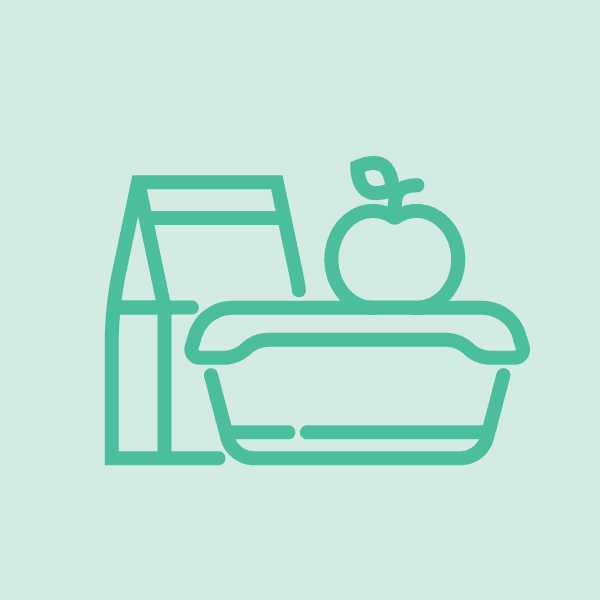
Physical wellbeing
- In line with the 2021 Resilience Survey national average, most primary school students engage in physical protective factors regularly including healthy eating, obtaining adequate sleep, and keeping physically fit.
- While the majority of secondary students report healthy eating and keeping fit, only around one quarter of students get at least 8 hours of sleep per night.
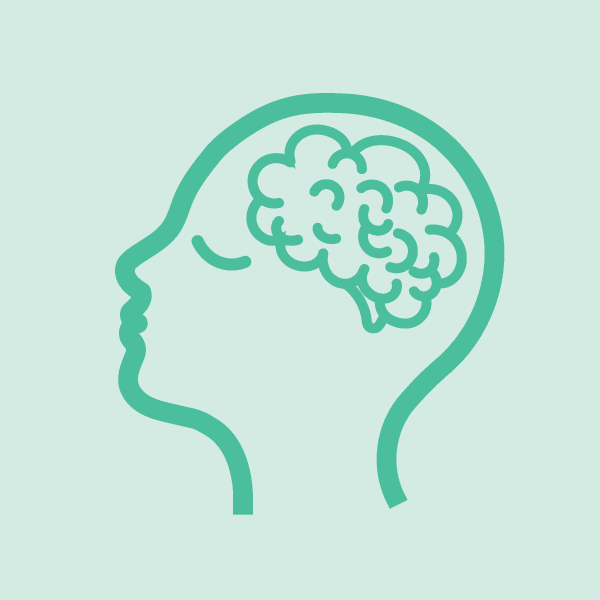
Mental wellbeing
- Most primary students report moderate to high overall life satisfaction and most secondary students report moderate overall life satisfaction, similar to the 2021 Resilience Survey national average for both groups.
- However, reports of depressive and anxiety symptoms were slightly higher than the 2021 Resilience Survey national averages for primary students and similar to the 2021 national average for secondary students.
- Almost 1 in 3 primary students and more than 1 in 3 secondary students are at risk for depression and anxiety.
- Students not identifying as male or female were at greatest risk for both depression and anxiety.
- More than 40% of all primary students were at risk of trauma-related stress. Ratings of trauma-related stress were lower for secondary kids, with less than 20% at risk of trauma-related stress.
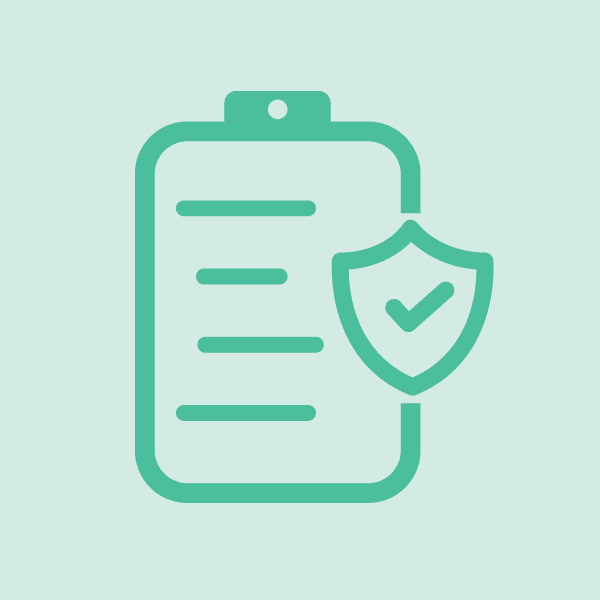
Safety and risk factors
- Students feel protected, with approximately 70% reporting always feeling safe in their schools and homes.
- 10% of secondary students engage often or frequently in risky behaviours including vaping, smoking, drinking alcohol or using illegal drugs.
- Approximately 4 in 10 primary students and 3 in 10 secondary students report being bullied at school, which is slightly lower than the national average of 2021 survey respondents. 2 in 10 students report being bullied online which is line with the national survey participants’ average.

Social identity
- Primary and secondary school students generally feel connected within their social support structures including teachers, family and peer support.
- Students generally report being trusting and forgiving towards themselves and others.

Learners mindset
- Learner’s Mindset measures children’s sense of hope for the future, level of avoidance coping behaviours and their engagement in the school environment.
- Most students report they try hard, enjoy learning, engage in extra-curricular activities and have fun at school.
- Despite this, almost 30% of primary students and 40% of secondary students display some disengagement from learning
What is the one thing you would do to support the wellbeing of young people?
Provide a support service that understands problems young people experience on a regular basis, and ways to deal with such problems.
Grade 9 student
I would help young people to not think badly about themselves and to not compare themselves to other people.
Grade 6 student
Mental health support for young people
Healthy North Coast funds and supports a range of services to support mental health and wellbeing for children and young people.
headspace
headspace centres offer mental health support and advice for young people aged 12 to 25. All services are free or low cost. Headspace centres are located at the Lismore, Tweed and Grafton, and are open Monday to Friday, 9am to 5pm.
Alternatively, headspace can also support young people online or by phone.
Safe Haven Community and wellbeing hubs
Located in Woodburn, Lismore, Mullumbimby and Murwillumbah, Safe Haven hubs are open to anyone seeking mental health support, including their family, friends and carers. Safe Haven hubs are open 12 — 6pm every day. Drop-ins are encouraged and you don’t need a referral or appointment. Visit the Safe Haven website to learn more.
If you need immediate support:
- 24hr Mental Health Line — 1800 011 511
- Lifeline — 13 11 14
- Beyond Blue — 1300 224 636
- For children under 12 years: 24/7 Kids Helpline — 1800 551 800
- In an emergency, call 000 or go to your nearest hospital emergency department
Resilience Survey — information for parents and caregivers
As part of the Resilient Kids program, Healthy North Coast partnered with schools to deliver Resilient Youth Australia’s Resilience Survey to schools across the Northern Rivers in October and November 2022.
Each school has its own secure client portal to access real-time aggregated survey data and a regional report will also be developed.
The Resilience Survey is Australia’s most widely utilised mental health and wellbeing survey for schools, already completed by more than 500,000 students in over 1,500 schools since 2013. It is conducted by Resilient Youth Australia, a leader in mental health and wellbeing data for Australia’s youth, and was co-designed with the University of South Australia.
Students will complete the survey online or as a paper copy at school during school time. It is user-friendly for students aged 7 years and over, and takes about 30 minutes to complete.
- “Do you feel safe at school?”
- “I have a teacher who cares about me”
- “Do you have fun at school?”
The survey has been reviewed and approved by the Human Research Ethics Committee at the University of Adelaide (approval number 22/82). This research project will be conducted according to the NHMRC National Statement on Ethical Conduct in Human Research 2007 (Updated 2018).
If you wish to speak with an independent person regarding any concerns, please contact the Human Research Ethics Subcommittee on [email protected] or (08) 8313 4936. Any concern will be treated in confidence and you will be informed of the outcome.
14th June 2023

